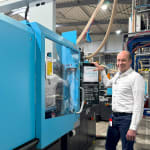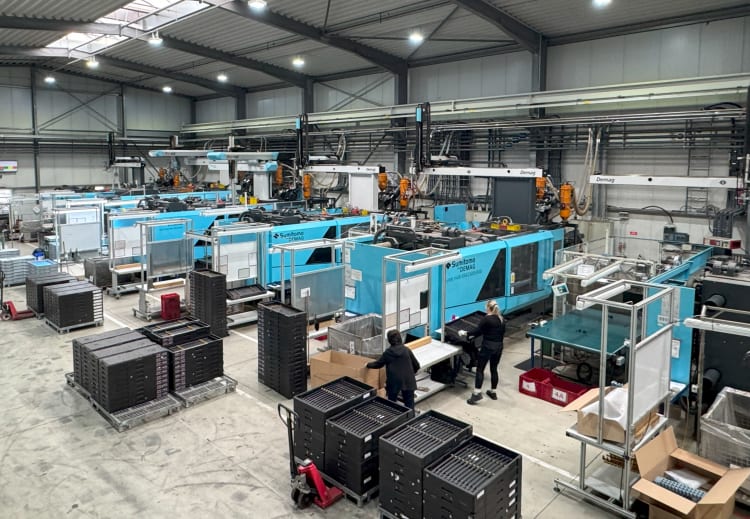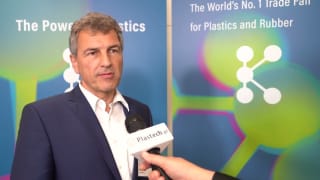
When Thomas Brüsch founded SLM Kunststofftechnik on a greenfield site in Oebisfelde in January 1998, the company ordered its first seven hydraulic injection molding machines with clamping forces from 800 to 3,300 kN from what is now Sumitomo (SHI) Demag Plastics Machinery GmbH in Schwaig. More than a quarter of a century later, the cooperation between the plastics processor and the machine manufacturer remains unchanged and has deepened further. In 2024, SLM purchased four fully electric injection molding machines with clamping forces between 750 and 4,500 kN, all from the Intelect series of the German-Japanese manufacturer. One of these was the 75th machine from Sumitomo (SHI) Demag installed at SLM, underlining the continuity of the relationship and the strategic dependence of the automotive supplier on a uniform machine pool.
Automotive specialization and two-component water deflectors
Managing Director Gunnar Kasprzyk, who has led SLM since the beginning of the year as Brüsch's successor, describes the cooperation as a partnership that goes beyond a pure supplier relationship. According to him, in the areas where SLM is active there are only a few alternatives to Sumitomo (SHI) Demag that are technically and economically suitable. SLM was originally founded by Brüsch as a student after a semester abroad in the USA. The company initially operated under the names SLM Modelltechnik and SLM Konstruktion, providing development services and prototype construction for the VW Group.
The step into series production of plastic components followed when VW pointed out that it was inefficient to develop parts at SLM up to series maturity and then transfer them to other suppliers for production. This led to the establishment of SLM Kunststofftechnik as a production company. Today, SLM employs around 300 people, produces approximately 44 million plastic parts per year using single- and two-component injection molding, and generates annual sales of around 45 million euros.
SLM's main customer is the VW Group with all its brands and derivatives, including Audi, Porsche, Seat, Skoda, Bentley, Bugatti, and Lamborghini. BMW is also supplied directly. In addition, SLM counts numerous Tier-1 suppliers among its customer base, including Rehau, Magna, Faurecia, Kiekert, and Meraxis. Around 90 percent of the components produced are exterior parts such as bumpers, add-on parts, technical brackets, and mounts. Within this portfolio, SLM highlights a particular strength in water deflectors manufactured using two-component injection molding. These components are described as highly complex parts with strict dimensional, surface, and functional requirements, giving the company a distinctive market position in this niche.
Machine pool dominated by Sumitomo (SHI) Demag technology
From the outset, the machine pool at SLM has been shaped by Sumitomo (SHI) Demag technology. The initial contact with the machine manufacturer arose because Brüsch's father already operated two machines from this supplier and established the connection with the then sales engineer. Since then, the cooperation has continuously expanded. Today, 57 injection molding machines are installed across six production halls at SLM, of which 43 come from Sumitomo (SHI) Demag's locations in Schwaig or Wiehe.
According to Kasprzyk, SLM particularly values the service quality and machine availability provided by the supplier. As an automotive supplier, the company works with tight lead times and limited warehousing, making rapid service response times critical. He points out that service technicians from Sumitomo (SHI) Demag have repeatedly been available on site at short notice and that some engineers have been supporting SLM for 25 years, with a deep understanding of the company and its environment. Around-the-clock availability and a stated target of problem resolution within 24 hours are cited as central elements of the collaboration.
A further advantage, from SLM's perspective, is the uniformity of the machine fleet. Since all machines originate from one manufacturer, the company can reduce its stock of spare parts and simplify staff training. All machines are equipped with NC4 and NC5 controls, which, according to Kasprzyk, ensures that training content is transferable regardless of whether a machine has a clamping force of 1,000 or 10,000 kN. This facilitates the flexible deployment of operators between different halls.

The IntElect 130-450 produces radar-capable plastic covers for the VW Group
Shift towards fully electric Intelect series
The technological orientation of the cooperation has changed significantly over time. While the first machines at SLM were exclusively hydraulic, the company has been using fully electric injection molding machines from Sumitomo (SHI) Demag since 2014. At that time, SLM purchased its first Intelect Smart with a clamping force of 1,000 kN for the production of mirror housings for the VW Group. This platform part is installed in numerous vehicles across the group, including VW, Seat, Porsche, Lamborghini, Skoda, Audi, and Bentley, with annual production volumes exceeding ten million units.
Kasprzyk reports that he is highly satisfied with the current Intelect 2 series. SLM now operates 13 fully electric machines of this type. Most recently, the company added one Intelect with 750 kN, one with 1,300 kN, and two with 4,500 kN clamping force. The purchasing decision was supported by an economic calculation prepared by Sumitomo (SHI) Demag on the basis of process parameters, indicating when the investment would amortize. SLM also carried out its own energy measurements and compared the results with those of hydraulic systems. These investigations, according to Kasprzyk, confirmed the advantages of the electric machines.
The Intelect series is described as offering around two percent higher availability on average, combined with dynamic, precise, and parallel axis movements that can lead to up to ten percent higher output. Compared with conventional fully electric competitor products, the Intelect is reported to require up to 20 percent less energy, and compared with hydraulic machines, up to 80 percent less energy. High precision and repeatability help reduce scrap, which in turn increases output and lowers costs. These aspects are presented as key factors for energy-efficient and sustainable production.
Kasprzyk also points to qualitative and maintenance-related advantages. In fully electric machines, he notes, hydraulic oil is not required, and the typical replacement of numerous hydraulic hoses every six years on larger servo-hydraulic systems is eliminated, reducing maintenance costs. Furthermore, the electric technology does not require warm-up phases after switch-on. In everyday production, the lower noise level in halls with fully electric machines compared with areas where hydraulic machines are running is also noticeable. The main arguments for converting to fully electric drive technology were, according to Kasprzyk, the significant energy savings and improved process stability.
Intelect in demanding small and medium-sized applications
At present, the clamping force of the Intelect series is limited to 5,000 kN. For larger components such as water deflectors, SLM therefore continues to use hydraulic Systec multi machines from Sumitomo (SHI) Demag. The new Intelect systems are primarily deployed for smaller and more demanding applications.
One example is an Intelect 130-450 equipped with an integrated testing cell that produces radar-transparent covers for radar sensors for the VW Group. After molding in a two-cavity tool, the parts are automatically removed and transferred directly to the testing cell. There, sensors check the components for defects and wall thickness. Only approved parts are then placed on a conveyor belt and subsequently packaged. With increasing part complexity expected in future projects, SLM anticipates that the application range of Intelect machines in the plant will continue to grow
Digital services: myConnect and myAssist
The new Intelect machines acquired by SLM in the past year are equipped with the connected support services myConnect and myAssist. These digital tools are intended to deepen the cooperation in the area of service and process optimization. Via myConnect, experts from Sumitomo (SHI) Demag can access the machines remotely and support SLM without having to be physically present on site in every case. The platform serves to manage inefficiencies, lower total cost of ownership, resolve errors, and minimize downtime.
myConnect is implemented as a modular platform that provides access to a wide range of functions and enables fast response to production interruptions. The fully integrated "Site Control" hardware acts as an interface between the machine's CPU and HMI and the software environment. On this basis, various machine parameters can be accessed and production data can be visualized in real time, regardless of location. In the event of a malfunction, a service request can be initiated directly, after which myConnect establishes a secure VPN tunnel to a central server and creates a ticket in the service system.
The central server acts as an intermediary between the customer and Sumitomo (SHI) Demag and is operated exclusively in Germany, subject to strict GDPR requirements. Data exchange via myConnect is carried out with the consent of both parties. TÜV IT certification is cited as confirming the security level of the solution.
The myAssist software is designed to increase process transparency for molders by enabling deeper insight into process parameters. Cycle- and time-series-based data can be analyzed, and users can create individual dashboards, for example with material or consumption metrics or user-defined KPIs. The tool aims to reduce downtime and optimize resource and capacity utilization. According to the supplier, myAssist also serves as the basis for future AI-based applications that will be developed across processes.

View into Injection Molding Hall 3
Networking, MES integration, and Industry 4.0
All new machines at SLM are equipped with the latest OPC-UA interface to enable integration into the Manufacturing Execution System (MES). This setup supports virtual production for planning and monitoring manufacturing orders. Orders are recorded, processed, and made available at the machine in digital form, enabling paperless workflows. The associated material management for each order is handled in the background.
Kasprzyk emphasizes that SLM has been applying Industry 4.0 principles since 2013, when the company implemented its MES and connected all production processes. With a single click, data on production performance in terms of availability, quality, and output can be retrieved for different time periods, such as daily, weekly, or monthly views. The OEE (Overall Equipment Effectiveness) key figure is used to compare the actual performance of production lines with their theoretical potential.
Production at SLM runs around the clock five days a week. A central material supply system transports around 110 different types of plastic granules from silos and octabins to the machines in the six molding halls. In addition to the injection molding halls, the site in Oebisfelde includes its own assembly division occupying two halls, seven warehouse buildings, and three office and utility buildings, comprising in total 19 buildings and an area of around 60,000 square meters. In December 2024, SLM opened a new warehouse with an area of 2,810 square meters. According to Kasprzyk, this expansion has brought the site to its current capacity limits, although there is still room for further growth within the existing halls.




